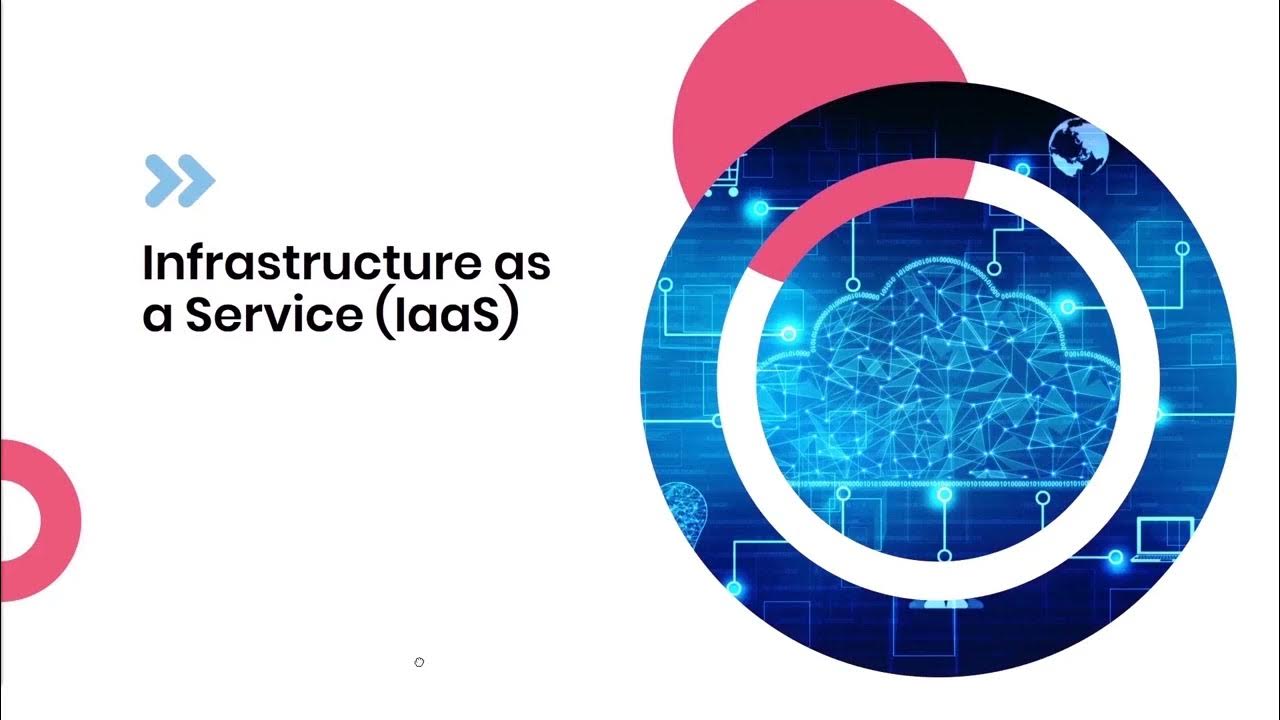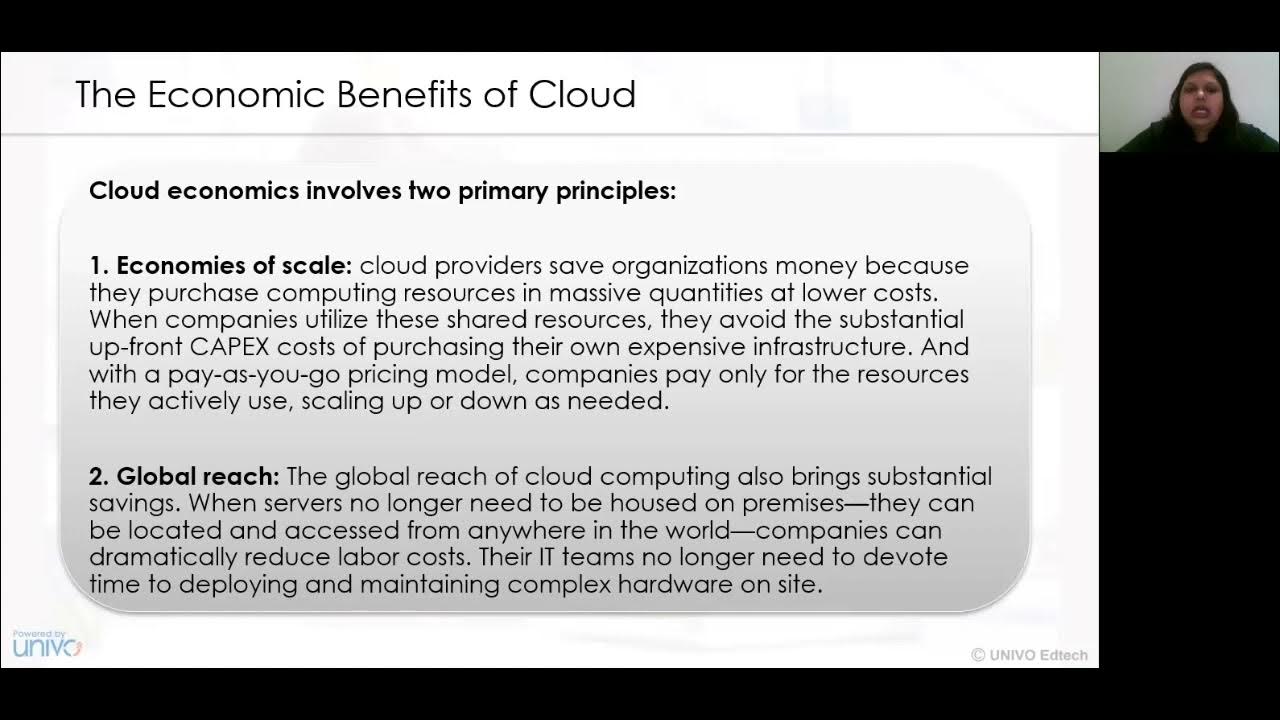The 5 Benefits of Cloud Computing Explained in 3 Minutes
Summary
TLDRThe video script delves into the remarkable advantages of cloud computing, highlighting its five key benefits. It emphasizes the speed and agility of cloud services for rapid application deployment, scalability and elasticity to handle varying demands, economies of scale that reduce upfront costs, global reach for faster access to services, and high availability ensuring continuous operation. These benefits underscore the popularity and utility of cloud computing, making it an indispensable part of modern technology.
Takeaways
- 🚀 Speed and Agility: Cloud services offer instant availability, allowing for rapid setup and deployment of applications, accelerating the development and innovation cycle.
- 📈 Scalability and Elasticity: Cloud computing provides the flexibility to scale resources up and down according to demand, ensuring smooth performance even during traffic peaks and preventing system overloads.
- 💰 Economies of Scale: By operating at a large scale, cloud providers like AWS offer services at a bulk discount, allowing businesses to avoid high upfront costs and benefit from cost-effective pricing.
- 🌐 Global Reach: With data centers worldwide, cloud providers ensure faster access to services by physically locating closer to users, reducing latency and improving service speed.
- 🔁 High Availability: Cloud services are designed for continuous operation, with backup systems and redundancy in place to ensure minimal downtime and maintain service reliability.
- 🛠️ Instant Setup: No need to wait for hardware; cloud services can be initiated with just a few clicks, streamlining the process of getting started.
- 🌍 Data Center Proximity: Physical proximity of data centers to users enhances service speed and responsiveness, highlighting the importance of physical infrastructure in cloud computing.
- 💡 Cost-Effectiveness: The bulk purchase model of cloud services reduces the financial burden on businesses, making advanced IT capabilities more accessible.
- 🔄 Dynamic Resource Management: Applications can dynamically adjust to varying loads, optimizing resource usage and cost-efficiency.
- 🌟 Continuous Innovation: The ease of launching and scaling applications in the cloud encourages ongoing innovation and adaptation to changing business needs.
- 🔒 Redundancy and Reliability: Cloud providers implement multiple layers of redundancy to ensure service continuity and reliability, even in the face of potential failures.
Q & A
What are the five key benefits of cloud computing mentioned in the script?
-The five key benefits of cloud computing mentioned are Speed and Agility, Scalability and Elasticity, Economies of Scale, Global Reach, and High Availability.
How does cloud computing offer speed and agility in setting up services?
-Cloud computing provides speed and agility by making services available almost instantly. Users can set them up quickly without waiting for hardware orders, just by clicking a few buttons.
What does scalability in cloud computing mean and why is it important?
-Scalability in cloud computing refers to the ability to grow resources as needed. It is important because it allows applications to handle varying demands without getting overloaded or crashing.
Could you explain the concept of elasticity in cloud computing?
-Elasticity in cloud computing is the ability to expand and contract services based on demand. This ensures smooth handling of traffic peaks and troughs, preventing system crashes.
How do economies of scale benefit businesses using cloud services like AWS?
-Economies of scale benefit businesses by allowing them to access services at bulk discount prices due to the massive scale of operation of cloud providers like AWS, avoiding hefty upfront costs.
What is the significance of global reach in cloud computing?
-Global reach is significant because it allows businesses to access services faster due to the presence of data centers worldwide, reducing latency and improving service delivery.
Why is physical proximity of data centers important in cloud computing?
-Physical proximity of data centers is important because it reduces the latency in service delivery. The internet relies on physical cables, and shorter distances mean less time for data to travel.
What does high availability in cloud services entail?
-High availability in cloud services means that they are designed to run continuously, 24/7, with backup systems and processes in place to ensure continuous operation even if primary systems fail.
How does the global presence of AWS data centers impact the speed of service access?
-The global presence of AWS data centers ensures that services can be accessed faster because there is likely a data center physically closer to the user, reducing the data travel time over the internet.
Why is it beneficial for businesses to avoid upfront costs associated with building infrastructure from scratch?
-Avoiding upfront costs is beneficial because it allows businesses to invest in other areas, leverage existing cloud infrastructure, and only pay for what they use, which can be more cost-effective.
What does the script suggest about the future of cloud computing?
-The script suggests that cloud computing is not going anywhere and that it is unlikely we will revert to old systems anytime soon, indicating its growing importance and permanence in the tech landscape.
Outlines

此内容仅限付费用户访问。 请升级后访问。
立即升级Mindmap

此内容仅限付费用户访问。 请升级后访问。
立即升级Keywords

此内容仅限付费用户访问。 请升级后访问。
立即升级Highlights

此内容仅限付费用户访问。 请升级后访问。
立即升级Transcripts

此内容仅限付费用户访问。 请升级后访问。
立即升级浏览更多相关视频

Módulo 9 - Cloud Trends

Cloud Computing In 6 Minutes | What Is Cloud Computing? | Cloud Computing Explained | Simplilearn

Is our data safe on Cloud Services?

M1.L6. Cloud Computing

Cloud Economics Cloud Computing infrastructures available for implementing cloud based services

Amazon AWS, Azure e Google Cloud: Come funziona davvero il CLOUD?
5.0 / 5 (0 votes)
